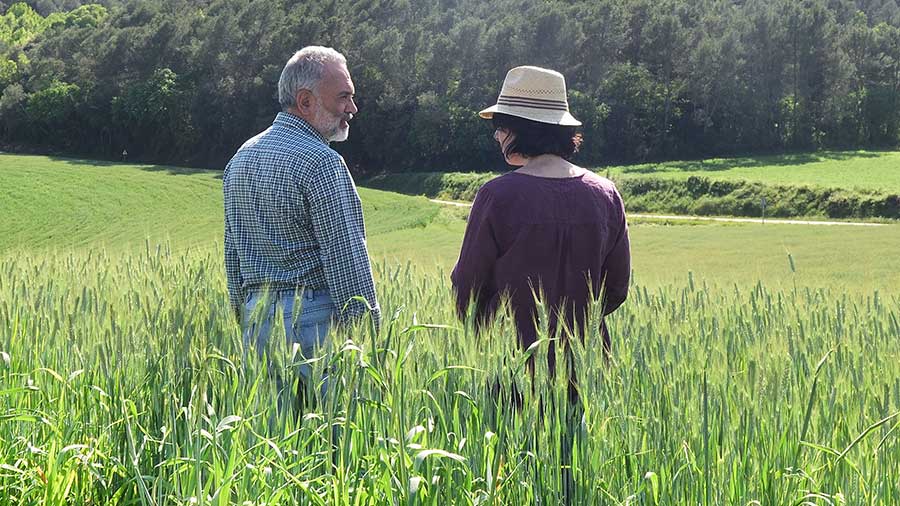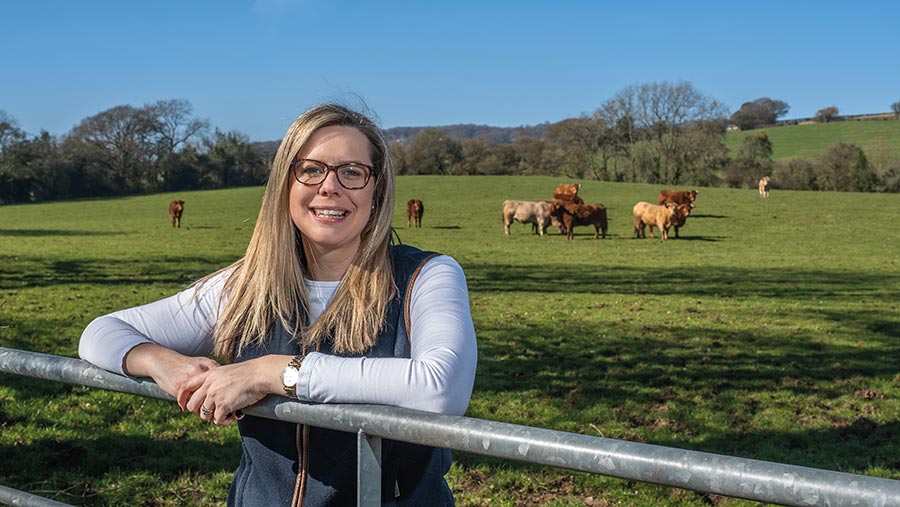The divorce process: What farming families need to know
 © AdobeStock/Curto
© AdobeStock/Curto Divorce is a complicated, stressful and emotional process for all families, but it becomes even more so when a farming business is involved.
A farm is more than just a job or an income – it is a way of life and a vocation, and has often been in the family for multiple generations.
So what could happen if the farm is part of a divorce?
Marjha Golding-Evans, partner and head of family law at RDP Law in Monmouthshire, explains the challenges, shining a light on the process and talking through the active steps every farming business can take to secure its safe future.
See also: How a Family Charter can help farm succession plans

Marjha Golding-Evans © RDP Law
Step by step
Think of the divorce and financial settlement as two train tracks which run alongside each other.
The divorce process needs to have begun for you to formally deal with your financial settlement.
A divorce can proceed without a financial order ever being made, but this is ill-advised and leaves the door open to future financial claims being made.
The two proceedings are unconnected and the basis of divorce very rarely has any impact on the outcome of a settlement or order.
Every case is different, but a typical case would follow this route.
1. The divorce
- File an application for divorce, with reasons, pay the court fee of £550 and provide your marriage certificate
- The court issues the application and sends it to your spouse
- Your spouse confirms receipt, saying if they want to defend (stop) the divorce and their reply on any costs requested
- You file a form then requesting decree nisi (the first step in the process, confirming your application meets the criteria for divorce)
- Once the decree nisi is granted, you have to wait to apply for decree absolute until six weeks and one day has passed
2. The financial settlement
By agreement
- Agree a date and way to exchange your financial disclosure voluntarily
- Obtain any valuations or statements needed and gather your financial information
- Exchange information with your spouse and read over their documents
- Sit down to discuss your proposal, with your spouse, with a mediator, or at a solicitors “round table” meeting
- Get legal advice on a settlement, financial advice on the outcome and accountancy advice on the implications
- Put your agreement into legal terms and file with the court for approval
Through the court
- Apply for a financial remedy order. Pay £215 application fee
- ·Get a timetable to follow, issued by the court
- Complete and exchange detailed “Form E” of financial disclosure with spouse/solicitor
- Prepare for court – set out your case, list any questions and prepare an asset list
- Attend the first court appointment to narrow down the issues
- Provide further evidence as required – this could include valuations, expert reports, accounts/statements
- Attend financial dispute resolution hearing for the judge’s view on the outcome
- Try to agree the settlement based on the judge’s indication or prepare for a final hearing
- If no settlement, draft a detailed narrative statement on what you think the outcome should be
- Attend a final hearing where a judge decides the financial settlement
Common misconceptions explained
1. Divorce just ends the marriage legal contract
A divorce is just a paper process that ends the legal contract of your marriage. For the significant majority of people, the application is straightforward (and set to become even more so when “no-fault” becomes one basis for divorce in April 2022).
You need your marriage certificate (or know the date of marriage to apply for a new one), £550 or an exemption from paying the fee, and a good lawyer to help you draft the application.
Not getting advice can mean you aren’t clear what boxes to tick and why, which can impact the financial side of things.
2. A second application is required for finances
Applying for divorce doesn’t automatically start a financial dispute.
A separate, additional application is needed; some couples (ill-advisedly) never square off their finances because doing so is not a requirement.
However, it is unquestionably very best practice to do so; even if you have agreed the whole settlement, getting it on paper and approved by a judge means it is legally binding.
3. Everyone’s divorce is different
When divorcing, you need friends to speak to and your professional team around you, but you will be bombarded with stories of “in my divorce…”
They are often impossible to compare, as each family has its own history, financial picture and personal circumstances. It is why there is no “formula” for dividing the matrimonial pot, and why expert, tailored advice is key.
4. Good planning is key
A farming divorce can be complex – this isn’t just lawyer speak for “expensive”.
The complexity comes from the legal structures (or absence of) in a farming business, with many generations being involved, attempts having been made to trust or gift which complicate matters, and the very fact of a single business needing to support two (or more) families going forward.
5. You don’t always have to go to court
When you are separating, you need to deal with your matrimonial finances.
Many separating couples can agree and, for those couples, their agreement is filed with the court.
If you can’t agree, then you typically apply to the court for one of two main reasons – to assist the process of disclosure and valuation, or to make the overall decision because you can’t decide between you.
6. Child arrangements are separate to divorce
The court doesn’t automatically get involved in contact arrangements for your children.
You first have to try to agree, then attempt mediation (or be exempt) If you still can’t agree, an application is made to the court for a child arrangements order.
7. Try to agree on the financial settlement
The financial separation can vary considerably when we think about what will be involved or how long/costly it will be.
The more you can agree on, the less the court has to deal with. Disclosure of every asset, debt and income source is key to help both parties in their discussions (or the court in their decision-making).
Without this, not only could the settlement be unfair, but material non-disclosure can re-open the door to future financial claims.
8. The court process can help couples progress
The powers of the court are usefully wide, and sometimes using those options for one (or all) aspects can really help couples make practical progress.
For example, the court can give directions about a valuation being done, an assessment of tax implications or, if one party isn’t engaging in the process, the court can order that they must engage or face a penal notice.
Lots of couples begin the formal process, and once they have seen the disclosure from their spouse or third parties, it enables their solicitor to effectively negotiate the terms.
It is not a case of all or nothing – you can use the court process as you need to, and often to both parties’ financial advantage.
9. Fairness is not the same as equality
It is unlikely that an equal division of the assets and accumulated wealth could be achievable for a farm, owing to the need to preserve the farm as an income source now, and as a viable entity to pass on to future generations.
At the forefront of the court’s mind (and that of any solicitor worth their fees) will be to ensure that financial needs are met. A priority for any minor children’s needs is paramount, but absolute equality is not always possible (nor desirable).
10. An expert team is invaluable
You need a financial adviser to consider cashflow planning, your accountant to be on the ball with income and tax, your land agent/agricultural adviser for property and land values – and maybe diversification or planning options to yield cash or income – and, crucially, a specialist matrimonial lawyer.
That lawyer should be well connected to professionals and the farming community, commercially minded and approachable.
Potential pitfalls and preventive solutions to take now |
|
|
Pitfall |
Solution |
|
Passing a farm or asset to an adult child, who later divorces |
Talking openly about a pre-nup or post-nup as part of your succession or tax planning is crucial. They aren’t seen as romantic but neither is divorce, so having a clear plan in place when the sun is shining – and agreeing how the farm and other wealth would be dealt with – is much easier than when the clouds of separation have descended |
|
Extended family members needing to release their value in the farm/land |
There can be many complexities which can be avoided by having a partnership agreement in place. This will say who has what, in what proportion, and how it would be valued/released in the future. This can help if many generations share in the business or farm |
|
A failed gift or trust |
When coming under scrutiny, well-meaning plans to gift or pass assets to younger generations may simply be ineffective. Doing this well, in the first instance (by getting legal advice), can prevent this. It can save considerable sums in capital gains tax or inheritance tax for you or your estate, and mark clear lines when it comes to any future divorce or financial separation |
|
The business supports an adult child or their family |
Being aware of the implication of financially assisting an adult child, especially during their own marriage, is hugely important. It can also provide considerable tax advantages during your lifetime, but it can set a precedent which a court may take into account and presume would continue (to your adult child) when considering that child’s ability to support their own family on divorce. This can include employment, regular cash gifts or property being transferred. Planning and legal advice are key |
|
Can’t manage your own affairs anymore due to ill health |
Having a lasting power of attorney (LPA) in place is crucial for all adults, not least for those with agricultural businesses or wealth to manage. An LPA is a document that sets out who makes decisions and practically deals with your financial affairs should you lose capacity to do so. It can also separately set out who can make medical decisions for you. Once you have lost capacity, it is too late to get an LPA, so getting advice from a specialist private client lawyer (who should talk to you about an LPA as part of your succession and tax planning) is vital. |
|
Son or daughter is getting divorced |
Get independent advice. In complex or acrimonious case divorces, a third party or trust can become a party to proceedings to ensure your son or daughter’s position is protected. Seeking advice early on, and engaging in measured, informed discussions can help. |
|
In a new relationship |
Some couples choose not to marry or remarry because it prevents the financial rigmarole on divorce. However, cohabiting without an agreement in place can be just as complicated, especially if you are both making financial or practical contributions to a property in one person’s name. A cohabitation agreement can remove uncertainty, setting out the clear intentions of you both, on how property is owned and how it should be shared (if at all) should you separate. Don’t avoid the question or think it isn’t relevant if you’re unmarried – get advice. |
